entire error message :
no required module provides package github.com/go-martini/martini: go.mod file not found in current directory or any parent directory; see 'go help modules'The error message “no required module provides package github.com/go-martini/martini: go.mod file not found in current directory or any parent directory; see ‘go help modules'” indicates that your Go project is not properly set up as a Go module, or that the go.mod file is missing or in the wrong place.
Here’s a breakdown of the problem and how to solve it, especially in the context of using a package like github.com/go-martini/martini:
Understanding Go Modules
Go Modules are the official dependency management system in Go, introduced in Go 1.11 and becoming the default in Go 1.16. They manage the exact versions of all dependencies (packages) your project needs.
A Go module is defined by a go.mod file, which lives at the root of your project’s directory. This file declares the module’s path and lists its dependencies.
Why You’re Seeing This Error
- Missing
go.mod: Your project directory (or any parent directory) doesn’t contain ago.modfile. Without it, Go doesn’t know it’s a module and where to find its dependencies. - Not in the module root: You might be running
go runorgo buildfrom a subdirectory within your module, but thego.modfile is in a parent directory. While Go should typically find it, sometimes specific commands or environments might miss it. - Go version < 1.11: If you’re using a very old Go version, modules might not be supported or enabled by default. (Less likely now, as most users are on newer versions).
- Incorrect GOPATH setup (less common with modules): In the pre-module era, code had to be inside
$GOPATH/src. With modules, your code can live anywhere, but if you’re trying to mix old and new practices, it can cause confusion.
How to Solve It ?
Follow these steps to correctly set up your Go module and resolve the error:
Step 1: Navigate to Your Project Root
Make sure you are in the directory where your Go project’s main code (.go files) resides, or where you intend for the go.mod file to live. This is usually the top-level directory of your application.
For example, if your project structure looks like this:
my-martini-app/
├── main.go
└── (other files)
You should be in the my-martini-app/ directory.
Step 2: Initialize Your Go Module
If you don’t have a go.mod file, you need to initialize your module. In your project root, run:
go mod init your_module_nameReplace your_module_name with the desired import path for your module. This usually follows a pattern like github.com/your_username/your_project_name or example.com/your_project.
Example:
If your project is my-martini-app and you plan to host it on GitHub:
go mod init github.com/your_username/my-martini-appThis command will create a go.mod file in your current directory.
Step 3: Add the Martini Dependency
Now that you have a go.mod file, you can tell Go to add go-martini/martini as a dependency.
Bash
go get github.com/go-martini/martiniThis command will:
- Download the
martinipackage and its dependencies. - Add an entry for
github.com/go-martini/martinito yourgo.modfile. - Create a
go.sumfile, which stores cryptographic checksums of your module’s dependencies to ensure integrity.
Step 4: Run Your Application
After completing the above steps, you should be able to run your application:
go run main.go(Or go build followed by running the executable).
Example Walkthrough:
Let’s say you have a simple main.go file:
// main.go
package main
import (
"github.com/go-martini/martini"
)
func main() {
m := martini.Classic()
m.Get("/", func() string {
return "Hello world!"
})
m.Run()
}
- Create a new directory: Bash
mkdir my-martini-app cd my-martini-app - Create
main.goinsidemy-martini-app/and paste the code above. - Initialize the module: Bash
go mod init github.com/your_username/my-martini-appYou’ll see:go: creating new go.mod: module github.com/your_username/my-martini-app - Get the dependency: Bash
go get github.com/go-martini/martiniYou’ll see output like:go: downloading github.com/go-martini/martini v1.0.0 go: added github.com/go-martini/martini v1.0.0(The version might differ). Now, if youls, you’ll seego.modandgo.sumfiles.cat go.modwill show something like:module github.com/your_username/my-martini-app go 1.22 require github.com/go-martini/martini v1.0.0 // indirect(Thego 1.22indicates your Go version.indirectmeans it’s a transitive dependency, or a direct dependency that doesn’t have a directimportin a file yet, but will be resolved). - Run your app: Bash
go run main.goYou should see output indicating Martini is running (e.g.,[martini] listening on :3000).
This process ensures your Go project correctly uses Go Modules to manage its dependencies.
